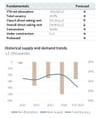Editor’s Note: This article first appeared in Realtor Magazine.
When the National Association of Realtors named its Culture Transformation Commission—a group of more than 70 members; state and local association staff; and NAR staff selected through a collaborative process—the aim was to identify and break down impediments to being an inclusive, welcoming and respectful organization for all.
NAR’s Leadership Team announced the Commission in October 2023 as an essential step in putting the organization on a new path forward. NAR continued down that path the following month with the appointment of Interim CEO Nykia Wright and again in December with the appointment of Chief Marketing & Communications Officer Suzanne Bouhia. In February, Wright engaged Karyn Detje to lead NAR’s human resources transformation.
Along with the staff changes have come shifts in NAR leadership. Kevin Sears, a broker from Springfield, MA, stepped into the presidency in January, making a commitment to help return the organization to stable ground, get back to the business of helping members succeed, and eliminate distractions from the job. Shortly after taking office, Sears announced that two former NAR presidents, Vince Malta and Sharon Millett, would fill vacancies in the 2024 NAR Leadership Team. Malta is a broker from San Francisco and was NAR’s 2020 president. Millett, a broker from Auburn, ME was NAR’s 1999 president.
“The real story [of NAR] is progress,” Wright said in a letter to members in February, calling out the CTC’s role. The group’s recommendations, she said, will shape the association’s progress into the future.
“We’ve reached out directly, and the overwhelming majority of our members have told us they trust in what we are doing to transform the organization,” Wright says. “We are not taking their trust lightly but are working every day to earn their continued confidence.”
Under the new staff and member leadership, NAR is communicating more deliberately, sharpening its focus on the core mission of serving its members, and moving toward becoming a nimble organization.
Four Areas of Focus
Part of that comes with the delivery of the CTC’s recommendations, which are expected in the fall, according to Ryan Davis, NAR’s vice president of diversity, equity and inclusion.
“This is a ripe opportunity for change,” says Davis, who serves as co-lead on the project. “While some of the work will likely spill over into 2025, we expect to see formal recommendations in November [at NAR NXT, Nov. 8–10, Boston].”
Under the leadership of its tri-chairs, the CTC has completed two of four phases of its work—information and data gathering and aligning on priorities. In the information-gathering phase, commissioners heard from thousands of association members and staff via interviews, focus groups, open forums and informal conversations. In the second phase, they aligned the findings into four common themes and identified opportunities for culture transformation within each theme.
Theme 1: Mission and Values
Opportunities: Clearly define our real estate–driven mission; appreciate and understand the work that NAR staffers, members, and state and local association staff perform; set expectations around how members and staff treat one another; and embed change throughout NAR.
Theme 2: Leadership
Opportunities: Set clear expectations and standards for those who lead across NAR—members, state and local association staff, and NAR staff. Review the entire leadership process—from the selection, training and evaluation of senior staff to the election, appointment and training and expectations of member leaders.
Theme 3: Governance
Opportunities: Rethink the association’s governance structure, its focus, and how it operates to enable members and staff to do their best work.
Theme 4: Compliance
Opportunities: Provide a safe space for all and promote accountability.
To guide the next two phases of the work—developing implementation plans and final review, adoption and implementation—the group recently engaged McKinley Advisors, a firm with deep roots and expertise in association management and transformation.
Working in parallel with the CTC, a Policies and Procedures Task Force is creating recommendations to improve NAR’s policies, procedures, trainings and systems to prevent inappropriate member behavior, encourage reporting of alleged misconduct, and promote an environment of transparency and accountability.
“Culture change takes time,” says Detje, who has led staff transformations within large organizations and is co-leading the project with Davis, “but I see an incredible commitment among the members and staff to make it happen. One thing I’ve found really remarkable is that, despite having been through an incredibly challenging 18 months, people are passionate about this organization and the work they do.”
The commission continues to welcome feedback from members and association staff. Want to share your ideas on transforming the culture of NAR and the REALTOR® organization? Email culture@nar.realtor(link sends e-mail).
Reprinted from REALTOR® Magazine Online (http://realtormag.realtor.org), April 24, 2024, with permission of the NATIONAL ASSOCIATION OF REALTORS®. Copyright 2024. All rights reserved.
Stacey Moncrieff is executive editor of publications for the National Association of Realtors and editor in chief of Realtor Magazine.










